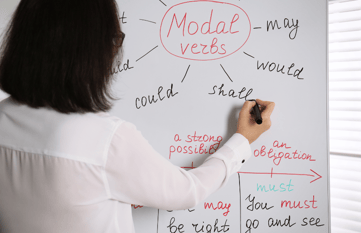

A recent article posted at Visualistcapital.com included a graph ranking the increase and decrease in college degrees by discipline over the last decade.
The number of students enrolling as English majors dropped by 32%. The second worst drop was the number of Education majors, which fell by 14% in that
same time.
What that means is that colleges will be sending fewer English teachers,
one of the largest departments in any secondary school, into the workforce. Who will fill the vacant positions, and what training will they lack?
When you consider this recent data alongside the growing number of retiring and
resigning veteran teachers, whom schools desperately need to mentor young teachers, you realize, we have a problem, Houston. We need good English teachers.
Perhaps you are thinking,
Who cares? AI is going to replace teachers.
AI can write anything I need.
Grammar software corrects all my grammar problems and spelling errors.
I don’t need anyone to analyze a book or discuss the deeper meanings of
symbols or themes. I need someone with strong technical skills.
If only it were that simple.
I suspect most employers know exactly how important the “soft skills,” which permeate the domain of English teachers, really are. Repeatedly, we see job skill lists topped with communication, critical thinking, cultural awareness, collaboration, and creativity. All of these skills form the backbone of a good English curriculum. They are the essential skills teachers of the English Language Arts work to instill in their students.
Good English teachers teach us how to analyze and discuss great stories that help us understand the human condition and ourselves better.
Discussing fictional stories allows us to step apart from contentious real world discussions and explore important conflicts and injustices in meaningful ways without the heightened emotion of a personal experience. Students learn that conflicts and their resolutions derive from a person’s worldview. They learn that how we think about the world and about people’s rights to act freely within that world informs our biases. THAT realization is fundamental to humans working together in collaborative communities.
Good English teachers help us to connect aspects of our lives to those of characters so that we gain empathy for people unlike ourselves.
Rather than aligning ourselves only with people just like us, we walk in the shoes of people who battle different, but wholly human, conflicts and feel their distress, anger, isolation, and grief. In books we travel to places we’ve never been, to urban neighborhoods or rural landscapes unlike our own. We join perilous journeys; we witness historical events and gain an understanding of why they occurred. We are invited into cultural celebrations and experience them through the eyes of one who belongs, and so we belong.
Good English teachers teach us how to engage actively and respectfully in group work.
They may intentionally team us up with students who think differently, forcing us to work through our opinions to find common ground, to work through the emotional power struggle of divvying up work fairly, and to present our work to the class with all group members’ voices being heard.
Good English teachers force us out of our comfort zones.
They often ask us to think more deeply about a book we read, to look for connections that aren’t immediately obvious. They ask us to personalize reading experiences, which forces us to examine parts of ourselves we may not even know exist. They require us to put on a costume, to recite a poem in front of an audience, to read aloud, or to enact a dramatic role. They call us to rethink and revise our work again and again and again. They require us to meet nit-picking formatting specifications and to pay attention to details and tiny marks.
Good English teachers equip us with the grammatical skills to write clearly and correctly so that others understand our words the way we intend them.
Proficiency in grammar isn’t just about knowing where a comma goes; it’s about knowing your options, filtering through the various possible ways to say something and landing on the structure and style that best communicates your intentions and keeps your reader’s attention
.
Good English teachers equip us with the critical thinking and critical reading skills we need to engage with potentially specious claims and arguments.
When we learn how to check credibility, identify markers of bias (which most writing will have to some degree), look for the unspoken counterarguments, and argue with the text as we read, we develop minds that can think and act logically rather than emotionally. We develop the mental habits of a truth seeker.
Good English teachers seek opportunities for us to engage with content creatively, not just systematically.
We may write our own stories and poems. We may design posters and book covers. We may generate preposterous ways for Romeo to declare his love to Juliet. We are stretched to think in symbols and metaphors, to perform in costume and accented voice, to enter history as an active participant rather than as an observer.
Most students never realize how those terribly stretching creative endeavors tap into our uniquely creative brains, whether artistic, scientific, or technological. We gain a glimpse of ourselves as creative beings.
We all need good English teachers. We need them to pull us out of our passive
postures and to engage us in the hard work of thinking beyond the text on the page, the hard work of writing or saying exactly what you mean, the hard work of considering other points of view, the hard work of working collaboratively to accomplish a task, the hard work of technical correctness, the hard work of being creative, the hard work of understanding what it means to live the human experience.



